- Home
- Peter S. Beagle
The Karkadann Triangle Page 2
The Karkadann Triangle Read online
Page 2
“Dang,” she says softly, while I scramble around for the pieces of my thoughts.
“Who—what—?”
“You can call me Geegee. Short for great-grandmother.” She shrugs a little. “Not enough greats by a long shot, but who’s counting?”
“You almost—”
“Almost is no better than not. No better at all.”
“Who are you?” I ask, I plead, for I haven’t seen such eyes, such knowledge, such recognition, anywhere else in this barren time where not even the moon remembers me. She says nothing, just pats her knees, and I sink to mine, crawl to her, wrap my arms around her skirts, lean against her like some giant child finding solace in those ancient bones. She slides a hand down my head, pats my back.
“I’ve been waiting for you for a very long time,” she says. “I was there with you when the sorcerer sent you into the future. I was the princess you never saw.”
“Hah?” I say into her skirts. Then I am quiet, remembering again the smile of triumph in the sorcerer’s dead eyes. I think, barely understanding myself: this future would explain that smile. Another word intrudes. I don’t want to think about it; I just want to kneel there at the old woman’s feet, feeling her stroke my hair.
Princess?
“He’s not dead, you know,” she says, and I feel my heart again, tightening this time, reforming itself, growing hard, harder on the outside, sealing the seething fury within. I lift my face, stare at her blindly. Surely she would not say that, she would never light that flame unless she knew. I feel my wildness rage against where my hooves should be, my horn.
“I killed him.” I do not recognize my voice.
“There is a world,” she says very gently, her hand on my forehead where the horn once was, “in which I am not old, and he is not dead.” I hear myself make a noise in some language I do not know. Her fingers, warm and steady on my brow, quiet me. “I was foolish then. I made you into something more than wild and beautiful; my heart fashioned you into someone who did not exist. My heart wished you human, someone perfect, magical, who could love me. Silly girl, I was. Foolish princess. But no more foolish than the sorcerer, who looked at me and wanted me changed into someone who could love him. He could love only me; I could love only you. You stood between us, in his eyes. If you disappeared, he thought, my heart must turn to him. Together he and I turned you into some impossible creature who could never exist in any kind of peace.” Her fingers brush down my cheek, slide beneath my chin, and draw my face up so that she can look into my eyes. “He didn’t notice me watching, either, when he fought you. That was his mistake.” I stare into hers, wondering if she could see beneath the pale human surface of mine to the midnight within. For an instant, I see the memory in her eyes: her youth and beauty, the dream that she had made of me.
But I am far, far older than she, and wilder than she could imagine. “Where is he?” I ask.
“It took me all this time to find him,” she answers a bit impatiently, annoyed with herself. “All this time since you tumbled here. Of course I learned a few things, searching all those futures where you weren’t.”
I eye her silently, wondering. In the world the sorcerer had tossed me out of, I would have recognized the magic in her even before I ever saw the princess. But I’d never noticed that lovelorn maiden trailing hopelessly after me. Maybe, I realize, she hadn’t been a budding sorceress then. Or a virgin, either, for that matter. Which, on the whole, was none of my business. But I wonder suddenly what she truly wanted from me.
So I ask her.
“Well, of course,” she answers without surprise, “my passion for you had nothing much at all to do with love.”
“Of course,” I echo with bewilderment.
“I wanted to be you. All that power. All that beauty. Since you inspired me to be what I have become, I feel I owe you a bit of help.” She pats my cheek, then stirs, hands on the rocker arms, rising, so that I am forced to let go of the safehaven of her strength, her understanding heart. I move reluctantly; she adds, as I get to my feet, “That’s why we need the sorcerer.”
“I know I killed him,” I protest. “I know I did.”
Her mouth tightens; I glimpse the lightning glint of power in her eyes. “He is a wily one,” she murmurs grimly. “He fled that body you killed on the flow of its last breath.”
“Where is he?” I demand. “I’ll—”
“You’ll what?” she asks, reminding me, with a sweeping glance, of the awkward, unwieldy body he left me in. It had its weapons, I realize, an arsenal between my great feet and my big, hard head. Not a pretty thought, I know, but handy, so to speak.
She adds, maybe reading my mind, “We want him alive.”
“We.”
“We need him to undo with his own power what he has done to you. It is a twisted, tangled piece of work, that spell. But I have learned a thing or two, by now, and I can make him eat his words.”
“How?” I ask incredulously.
“By giving him what he thought he wanted.”
“You.”
She gives me a tortoise-smile, thin-lipped, leathery. “Something like that. You’ll see. You don’t have a reason to hang around this place? No one to say farewell to?” I shake my head. “Neither do I. Say good-bye to Geegee.”
“What is your name?” I wonder as she holds out her hand for mine. Then someone hits the bell at the reception desk, and the hotel, with Geegee still sitting in her rocker, fades away around us along with my question.
In that nameless place, I see again the dimensions of the princess’s sorcery: how much she has learned since she shadowed me and I never noticed her, any more than I paid heed to what clung to my hooves and followed me everywhere. She changes into white fire, moonlight, foamlaced wave, midnight.
She becomes me.
And then she changes me.
And I, beautiful and virgin in any world, no words left in me of any language, can only follow her helplessly to watch her battle for my lost self.
NO, THEY ARE vanishing now , the karkadanns; at least they are almost gone from this part of Persia. Which is a very good thing, and you’ll find no one in the land to tell you otherwise. It is an especially good thing for a man master of the only working elephant herd north of Baghdad. If your business is felling trees and hauling them off to the river, to be rafted downstream to the lumber mill and turned into palaces, ships, furniture, what you will—then you are almost bound to come to me and my elephants. It has been my family’s trade for four generations, and my eldest son, Farid, will make the fifth when I am gone. It is our place in the world. It is what we do.
And it is only in this generation—my generation—that we have found ourselves increasingly free of those monsters, those terrible horned demons, the karkadanns. You have never seen one, I assume? No, not likely, coming from Turkey as you do. All the same, you must surely have heard that they are huge creatures, easily the size of Greek bulls, with double hooves, tails like lions, hides like thick leather plates—and that horn! Six, even seven feet long they run; and with the power of that great body behind it, they can splinter a cedar or an oak into kindling. I saw it happen just so when I was a boy.
That same horn can also split an elephant like a dumpling. I have seen that happen too.
Why karkadanns hate elephants as particularly and intensely as they do, no scholar has ever been able to explain, not to my satisfaction. I still have nightmares about seeing two karkadanns charging down out of the hills they favor, bellowing that chilling challenge of theirs—like battle horns, only deeper, and with a more carrying tone—and watching helplessly as they went through my herd, slashing left and right, literally spitting elephants on their horns like kebabs, then hurling them aside and going on to the next poor picketed beast. The elephants almost never fought back, never even tried to run away. Elephants are very intelligent, you know, and perhaps their imaginations simply paralyzed them: they could see what was going to happen, see it so clearly that they could not move.
I felt the same way, watching those karkadanns coming.
They trample farmers’ fields too, without a thought, most especially during the mating season. The farmers plant extra crops for just that reason, hoping to salvage something after the beasts get through with their wheat or their corn, their arbors or their orchards. And as for guards—if you can hire any—or dogs, if you can keep them from tucking tail and fleeing at the first distant smell of a karkadann . . . well, why even discuss it? We lost men too, in those old days, as well as elephants.
The karkadann has no natural enemies. I am told that a thousand years ago, the dragons kept them within reasonable check; but, of course, in our human wisdom, we killed off the dragons in the egg and the nest, because they cost us a lamb or a goat now and again. So—of course—the karkadanns promptly ran wild, and we could only be grateful that at least they were not carnivores, like the dragons. That was our sole blessing, for all those thousand years.
No, we did have one thing else to thank the gods for in our prayers: the fact that karkadanns never drop more than one foal at a time. As many as two . . . no, it doesn’t bear considering. Two to a birth, and they would own the country by this time. And other lands too, perhaps—who knows?
They are entirely vegetarian—though their two curving fangs imply otherwise—and entirely solitary by nature, except for those few weeks when they run mad with lust, and are then very nearly as likely to attack one another as they are elephants or humans. Even the females can be badly hurt during the rut; and more than once I have been gratified to encounter a pack of jackals feasting on the carcass of a karkadann bearing the marks of a comrade’s brutal assault. All in all, an unlovely, unadmirable, and altogether detestable creature. And your fascination with it is a complete mystery to me.
But it would not be so to Heydari, my third son. You will meet him at dinner, Farid being away on business. Which is a pity, because I would like you to observe the difference between them. Farid is me in large, as you might say, being that much bigger and that much more ambitious—though not yet that much cleverer, though he thinks he is. I do not always like him, I suppose—do you like all your children all the time?—but I understand him, which is a comfort and a reassurance, and makes for a peaceful association. But Heydari. That Heydari.
You would never take them for brothers if you met them together. Heydari is small and slight, and much darker than Farid, and much less immediately charming. I think he makes a point of it, having seen Farid making friends everywhere, instantly, all his life. He has never been any use with the elephants, and we would be out of business in a month if I put him in charge of my accounts. Yet he is more intelligent than Farid—quite likely more intelligent than all the rest of us—but I cannot see that it has thus far done him much good. All the same, I confess to a feeling for him that I can neither explain nor defend. Especially not defend, not after the time he saved the life of a bloody karkadann.
How old was he? Thirteen or fourteen, I suppose; when else would you be that stupid, in exactly that way? As he told it in his own time—long after he should have told it—he found the creature high in those same foothills you came through, being drawn to it by the urgent calling of a ringdove; which, for reasons no one has ever fathomed, is the karkadann’s only friend. As curious as any boy, he climbed after the bird and followed it to the entrance of a cave, where the beast lay bleeding its life away, and good riddance, through several deep wounds on its throat and flanks. It was barely breathing, he said, and the yellow eyes it tried to focus on him were seeing something else.
Like any man in this realm—any man but my son—I would either have helped the miserable monster on its way, or merely sat myself down and savored its passing. But not Heydari, not my softhearted, softheaded boy. He immediately set about fetching the karkadann water from a nearby spring, going back and forth to carry it in his cap. Apart from the stupidity of it, it was a risky matter as well, for the creature was in pain, and it lunged at him more than once with the last of its strength. He treated its injuries with what herbs he could find, and bound them with strips torn from his own clothes, while the ringdove perched on that murderous horn, cooing its approval. Then he went away, promising to return on the following day, but certain that he would find the karkadann dead when he did. I have said that he has never been of any practical use with the elephants, but he has been a kind boy from his childhood. An idiot, but always kind.
Well, he did return, keeping his word; and, unfortunately, the wretched beast was living yet. It was still unable to raise more than its head—which it did mostly to snap at him, even with one of those wicked fangs broken off halfway—but its wounds had stopped bleeding, and its breath was coming a bit deeper and more steadily. My son was greatly encouraged. He brought it more water, and fetched an armload or two of the fruits and vines that karkadanns favor, laying it all within reach in case the creature’s appetite should revive. Then he sat close beside it, because he is a fool, and recited the old, old prayers and sutras most of the night before he went home.
And climbed back up the next day, and the day after that, to attend to that vile animal’s recovery. Mind you, he told us, his own family, nothing of this—which, I must say, was the first intelligent thing he had done in the whole mad business. As many losses as we had endured over the years, in terms not merely of dead elephants, but taking into account the cost of workers, of lost time and equipment and the timber itself, we would all probably have fallen upon him and torn him to shreds. To be nursing a karkadann back to health, in order that it might continue slaughtering, destroying . . . you see, even now I am sweating and snarling with rage at my own son.
Even now.
Now if this were a fairy tale out of the Shahnameh, the boy and the karkadann would become such fast friends that the monster would give up all its evil ways and turn to loving and aiding humanity, even against its own folk. Hardly. It did stop trying to kill Heydari, having finally connected his ministrations with its survival and recovery; but it permitted no liberties, such as petting or grooming—only the ringdove was permitted that sort of intimacy—and it would clearly have died itself before ever taking food from his hand. He tried to explain to me once why he could not help liking that quality in the beast.
“It was so proud, Father,” he said. “No, it was not even a matter of pride—it was just what it was, and not about to yield a fraction of itself to anyone, whatever the cost. Yes, it was a dreadful creature, wicked and heartless like all the rest of its kind . . . but oh, it was magnificent too—splendidly terrible. Father, can you understand a little of what I am saying?”
Of course I hit him. You can’t go around asking your father questions like that.
But that was later, well later. Meanwhile, he was caring for that karkadann every day—I should have been able to smell it on him; they smell like hay just starting to turn moldy—while the ringdove murmured smugly to them both, and his brothers were shouting for him to put his worthless self to some use cleaning the elephants’ quarters. And now and then, so he told me, he would look up from his meditating and see those yellow eyes fixed on him, and he would wonder what the creature was thinking, what it could possibly be thinking at that moment. Which I, or any man with the sense of a bedbug, could have told him, but let that pass. What difference? Let it pass.
Finally, there came the day when Heydari made his way to the cave, and found the karkadann standing erect for the first time. It was grotesquely thin for its great size, and it seemed barely able to lift its head with that monstrous horn, but it stayed on its feet, swaying dazedly from side to side, and looking every moment as though it might crumple completely. Heydari clapped his hands and shouted encouragement, and the karkadann snarled in its chest and made a weak feint at him with the horn. The boy was wise enough to come no closer, but went off to find as much of the creature’s preferred vegetation as he could carry in both arms. Then, as always, he simply sat down and watched it eat, rumbling evilly to itself. And as far as I
can ever suppose, he was perfectly content.
At least, he was until Niloufar discovered them.
She was a shepherd girl, Niloufar—I knew her father well, as it happens. When I think about it, it’s a wonder she had a flock to tend, as many sheep as the old man slaughtered on the day she was born. He had six sons, which was more than enough for him when he thought about the battles to come over their inheritance, and the celebration of Niloufar’s arrival lasted almost a week. So she was undoubtedly spoiled, treated like a princess from her birth, shepherdess or no; but she was actually quite a good girl, when all’s said and done. A little bit of a thing, but pretty with it—Farid was already eyeing her, and so was Abbas, my second boy—but I am not sure that Heydari had even noticed her, or remembered her name, for that matter. She’d noticed him, though, or I’m more of a fool than he.
Her flock had winded the karkadann, of course, and were having none of it, but fled in panic to rejoin in the little valley below the cave. Niloufar left her two dogs minding them and—being just as idiotically inquisitive as my idiot son—climbed back up to the cave mouth, having heard a familiar voice there. She knew the smell of a karkadann as surely as any sheep, and she was afraid, but she kept coming anyway. The rest of her family are quite sensible.
The karkadann growled savagely as soon as it saw her, and made as though to charge. Heydari cried out, “No!” and the beast halted, being still so weak that it almost fell with the first steps. But Niloufar was mightily impressed with a boy who could make a karkadann obey, and she said, “Have you actually tamed it, then? I never heard of anyone doing such a thing, not even a wizard.”
It was a great temptation to Heydari to say that he had indeed done this, but he was a truthful boy, even when he should lie, and he explained to Niloufar how he had found the karkadann near death and done what he could for it. This impressed her even more, for all that she feared and hated the creatures as much as anyone. And then . . . well, he is not a bad-looking boy, you know—favors his mother more than me, which is as well—and between one thing and another, she said, “I think you must be a remarkable person, and very brave,” which is all any boy of his age cares to hear from a girl. And I am sure he found the wit somewhere to mumble that he thought she was a remarkable person too . . . and all this with that bloody karkadann rumbling and eyeing them, ready to spear them and toss them and trample them to rags, as kind as my Heydari had been to the thing. And I suppose one compliment led to another . . .

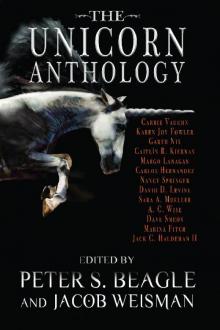 The Unicorn Anthology.indb
The Unicorn Anthology.indb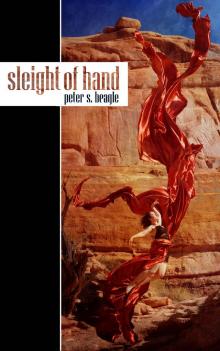 Sleight of Hand
Sleight of Hand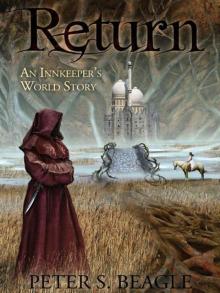 Return
Return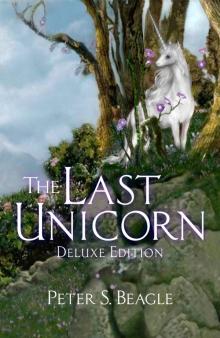 The Last Unicorn
The Last Unicorn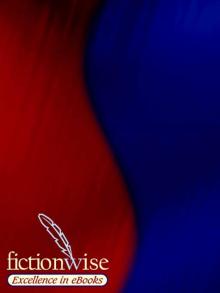 Two Hearts
Two Hearts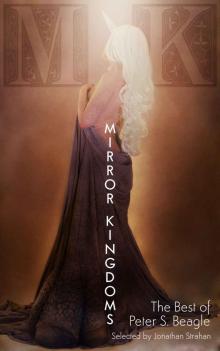 Mirror Kingdoms: The Best of Peter S. Beagle
Mirror Kingdoms: The Best of Peter S. Beagle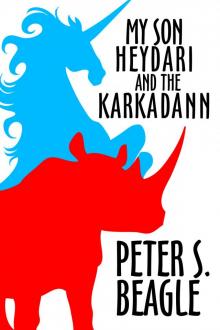 My Son Heydari and the Karkadann
My Son Heydari and the Karkadann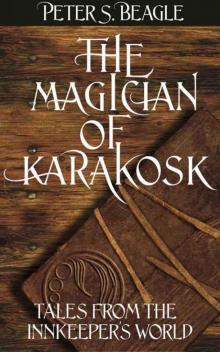 The Magician of Karakosk, and Other Stories
The Magician of Karakosk, and Other Stories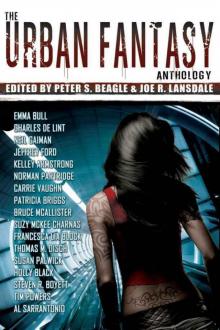 The Urban Fantasy Anthology
The Urban Fantasy Anthology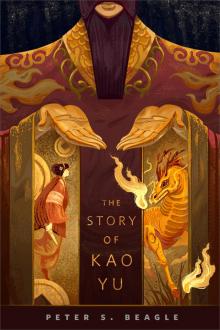 The Story of Kao Yu
The Story of Kao Yu The Karkadann Triangle
The Karkadann Triangle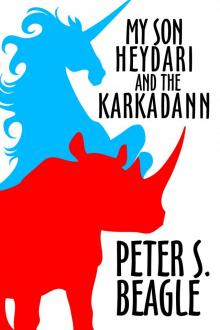 My Son and the Karkadann
My Son and the Karkadann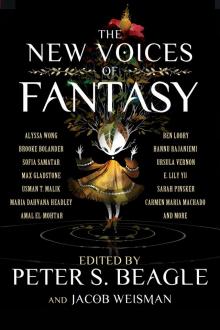 The New Voices of Fantasy
The New Voices of Fantasy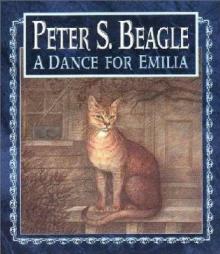 A Dance for Emilia
A Dance for Emilia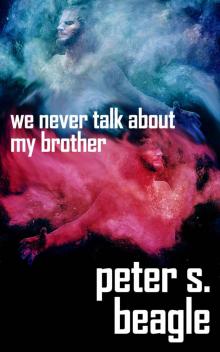 We Never Talk About My Brother
We Never Talk About My Brother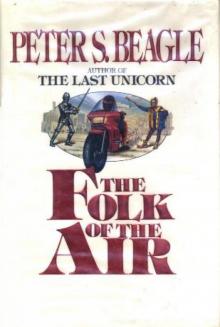 The Folk Of The Air
The Folk Of The Air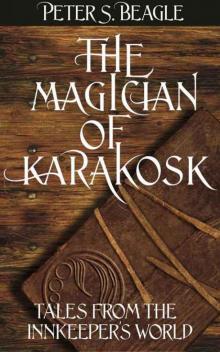 The Magician of Karakosk: Tales from the Innkeeper's World
The Magician of Karakosk: Tales from the Innkeeper's World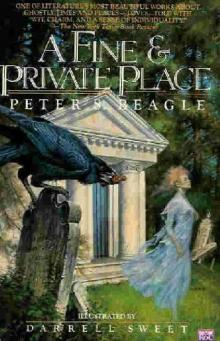 A Fine and Private Place
A Fine and Private Place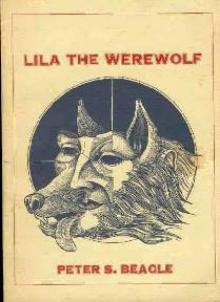 Lila The Werewolf
Lila The Werewolf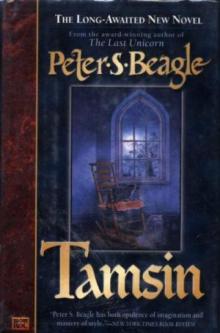 Tamsin
Tamsin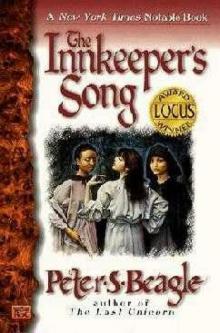 Innkeeper's Song
Innkeeper's Song